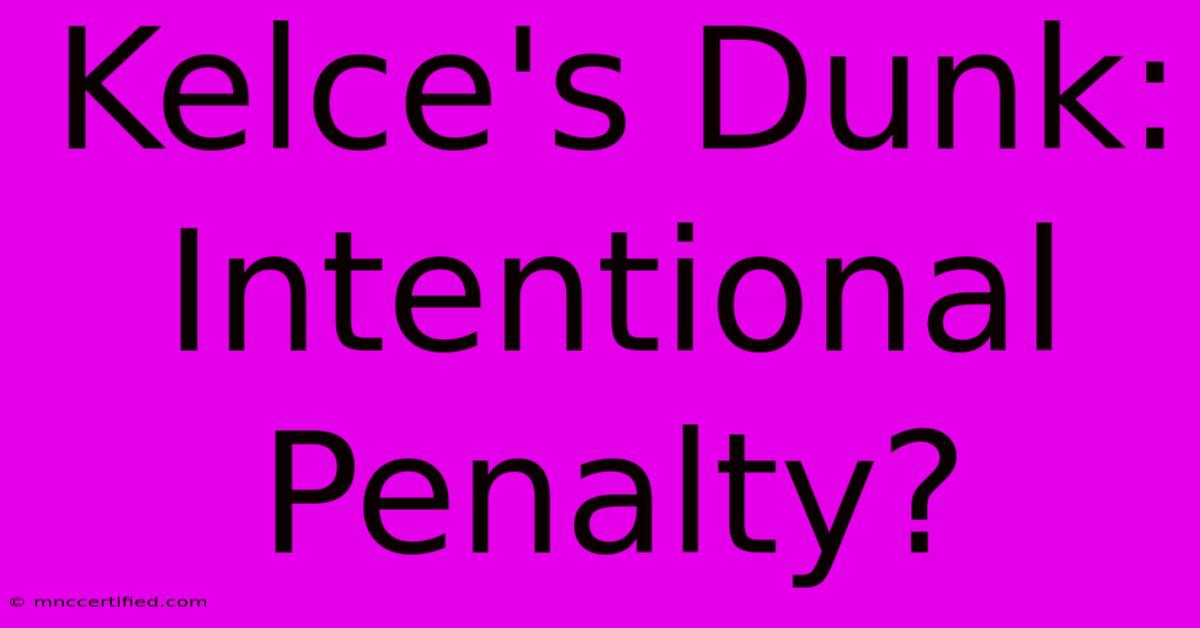Kelce's Dunk: Intentional Penalty?

Table of Contents
Kelce's Dunk: Intentional Penalty? Unpacking the Controversy
The infamous "Kelce Dunk" – Travis Kelce's celebratory dunk over the Chiefs' goalpost after Super Bowl LVII – ignited a firestorm of debate. Was it a spontaneous moment of unrestrained joy, or a calculated act designed to draw a penalty? Let's delve into the controversy and analyze the potential motivations behind Kelce's actions.
The Incident: A Recap
For those unfamiliar, after the Kansas City Chiefs secured a Super Bowl victory against the Philadelphia Eagles, tight end Travis Kelce celebrated by leaping onto the goalpost and performing a dunk. This celebratory act resulted in a 15-yard unsportsmanlike conduct penalty, a controversial call that sparked widespread discussion among fans and analysts. The question remains: was this an impulsive celebration, or a deliberate attempt to garner a penalty?
Intentional or Impulsive? Analyzing the Evidence
The debate hinges on intent. Proving intent is tricky, as it requires delving into Kelce's mindset at that precise moment. However, we can analyze several factors to construct a plausible argument:
Arguments for Intentionality:
- Previous Penalties: The NFL has a history of penalizing players for similar goalpost celebrations. Kelce, a seasoned veteran, is undoubtedly aware of these precedents. This knowledge suggests he may have knowingly risked a penalty.
- The Nature of the Celebration: The dunk itself wasn't a simple climb; it was a deliberate, athletic maneuver requiring a certain level of planning and preparation. This suggests a level of forethought beyond a spontaneous outburst.
- Post-Game Comments (or Lack Thereof): While Kelce hasn't explicitly admitted to intentionally seeking a penalty, his lack of a clear, apologetic statement could be interpreted as tacit acceptance of the risk. A truly spontaneous act would likely warrant a more straightforward expression of regret.
- Game Context: The Chiefs were already victorious. The penalty, while adding yards to the Eagles' kickoff, held no significant impact on the game's outcome. This minimizes the argument that the act was a mere oversight in the heat of the moment.
Arguments Against Intentionality:
- Unbridled Joy: The emotional intensity of the moment could have easily overridden any rational considerations. Kelce's ecstatic celebration may have been a purely instinctive reaction to an overwhelming victory.
- Lack of Direct Evidence: There's no concrete proof that Kelce intended to draw a penalty. It's purely speculative to suggest he calculated the risk and reward.
- Spontaneity of the Act: The celebration appears rapid and unplanned. While the dunk itself takes athleticism, the decision to perform it may have been impulsive.
The Bigger Picture: Rules, Respect, and Celebrations
Regardless of intent, Kelce's actions raise important questions about the NFL's rules regarding celebrations. Are these rules too restrictive, stifling the emotional expression of players after significant achievements? Many argue that a certain level of celebratory exuberance should be tolerated, particularly after a Super Bowl win. The line between acceptable celebration and unsportsmanlike conduct remains a subject of ongoing debate.
SEO Considerations: Keywords and Optimization
This article incorporates several SEO keywords and strategies, including:
- Primary Keywords: Kelce's Dunk, Intentional Penalty, Super Bowl LVII, Travis Kelce, Goalpost Dunk, Unsportsmanlike Conduct, NFL Penalties, Super Bowl Celebration
- Long-tail Keywords: Was Kelce's dunk intentional?, Did Travis Kelce mean to get a penalty?, Analysis of Kelce's Super Bowl celebration, NFL rules on goalpost celebrations, Super Bowl LVII controversy.
Off-Page SEO: Promoting this article through social media, relevant forums, and sports news websites will significantly improve its visibility and ranking.
Conclusion:
Ultimately, whether Kelce's dunk was intentional remains a matter of speculation. The evidence points towards a grey area, leaving room for interpretation. However, the incident highlights the ongoing tension between players' emotional expressions and the NFL's rules, prompting a wider conversation about the balance between celebrating victory and maintaining sportsmanship.

Thank you for visiting our website wich cover about Kelce's Dunk: Intentional Penalty?. We hope the information provided has been useful to you. Feel free to contact us if you have any questions or need further assistance. See you next time and dont miss to bookmark.
Featured Posts
-
Who Voices Wallace In 2024
Dec 26, 2024
-
Zay Flowers Injury Ravens Game Status Today
Dec 26, 2024
-
Hanukkah And Christmas Shared Holiday Spirit
Dec 26, 2024
-
Review Robert Eggers Nosferatu Remake
Dec 26, 2024
-
Trafford Centre Sales Boxing Day Shop Hours
Dec 26, 2024